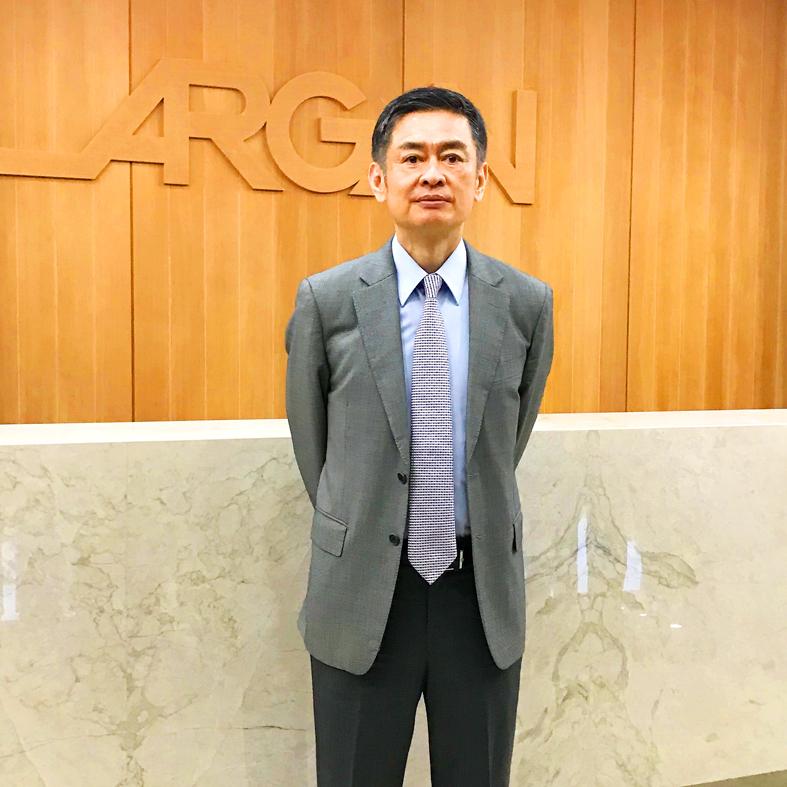Smartphone camera lens maker Largan Precision Co (大立光) has sued Motorola Mobility LLC for patent infringement, the Apple Inc supplier said on Monday.
Largan said it has filed a lawsuit with a court in the Northern District of California, accusing Motorola Mobility, which is under the corporate umbrella of China’s Lenovo Group Ltd (聯想), of infringing on six patents related to 5G smartphone camera lens production.
While Largan did not elaborate on its claims, the company reiterated its determination to safeguard its intellectual property rights through legal action.

Photo: Chen Mei-ying, Taipei Times
Local media reported on Monday that the lawsuit involved patents for super-wide-angle lenses infringed upon by the front and rear camera lenses used by Motorola Mobility in its One 5G Ace model.
Motorola Mobility, a spinoff of Motorola Inc, was sold in 2011 to Google, which then sold the mobile phone assets to Lenovo in 2014.
Motorola Mobility was the third-largest smartphone vendor in the US in the first nine months of this year, with a market share of 8 percent, behind Apple’s 43 percent and Samsung Electronics Co’s 35 percent.
Largan has resorted to legal action to protect its intellectual property rights in the past.
In 2013, Largan sued Taiwanese rival Genius Electronic Optical Co (玉晶光) in a court in the US for infringing on five patents involving smartphone camera lenses, and sued Samsung, also in a US court, accusing it of stealing six smartphone camera lens patents.
In 2019, Largan turned its attention to the notebook computer market by suing HP Inc and Taiwanese camera lens makers Ability Opto-Electronics Technology Co (先進光電) and Newmax Technology Co (新鉅科) in a US court, accusing them of infringing on four of its patents.
Those intellectual property right disputes were all settled with royalties received by Largan.
As for the lawsuit against Samsung, Largan secured large orders from the South Korean company through a settlement agreement.
Analysts said the lawsuit brought against Motorola Mobility by Largan aimed to fend off competition from the so-called “red supply chain” in China as it tries to expand its market share in that market.

Hon Hai Precision Industry Co (鴻海精密) yesterday said that its research institute has launched its first advanced artificial intelligence (AI) large language model (LLM) using traditional Chinese, with technology assistance from Nvidia Corp. Hon Hai, also known as Foxconn Technology Group (富士康科技集團), said the LLM, FoxBrain, is expected to improve its data analysis capabilities for smart manufacturing, and electric vehicle and smart city development. An LLM is a type of AI trained on vast amounts of text data and uses deep learning techniques, particularly neural networks, to process and generate language. They are essential for building and improving AI-powered servers. Nvidia provided assistance

DOMESTIC SUPPLY: The probe comes as Donald Trump has called for the repeal of the US$52.7 billion CHIPS and Science Act, which the US Congress passed in 2022 The Office of the US Trade Representative is to hold a hearing tomorrow into older Chinese-made “legacy” semiconductors that could heap more US tariffs on chips from China that power everyday goods from cars to washing machines to telecoms equipment. The probe, which began during former US president Joe Biden’s tenure in December last year, aims to protect US and other semiconductor producers from China’s massive state-driven buildup of domestic chip supply. A 50 percent US tariff on Chinese semiconductors began on Jan. 1. Legacy chips use older manufacturing processes introduced more than a decade ago and are often far simpler than

STILL HOPEFUL: Delayed payment of NT$5.35 billion from an Indian server client sent its earnings plunging last year, but the firm expects a gradual pickup ahead Asustek Computer Inc (華碩), the world’s No. 5 PC vendor, yesterday reported an 87 percent slump in net profit for last year, dragged by a massive overdue payment from an Indian cloud service provider. The Indian customer has delayed payment totaling NT$5.35 billion (US$162.7 million), Asustek chief financial officer Nick Wu (吳長榮) told an online earnings conference. Asustek shipped servers to India between April and June last year. The customer told Asustek that it is launching multiple fundraising projects and expected to repay the debt in the short term, Wu said. The Indian customer accounted for less than 10 percent to Asustek’s

Gasoline and diesel prices this week are to decrease NT$0.5 and NT$1 per liter respectively as international crude prices continued to fall last week, CPC Corp, Taiwan (CPC, 台灣中油) and Formosa Petrochemical Corp (台塑石化) said yesterday. Effective today, gasoline prices at CPC and Formosa stations are to decrease to NT$29.2, NT$30.7 and NT$32.7 per liter for 92, 95 and 98-octane unleaded gasoline respectively, while premium diesel is to cost NT$27.9 per liter at CPC stations and NT$27.7 at Formosa pumps, the companies said in separate statements. Global crude oil prices dropped last week after the eight OPEC+ members said they would